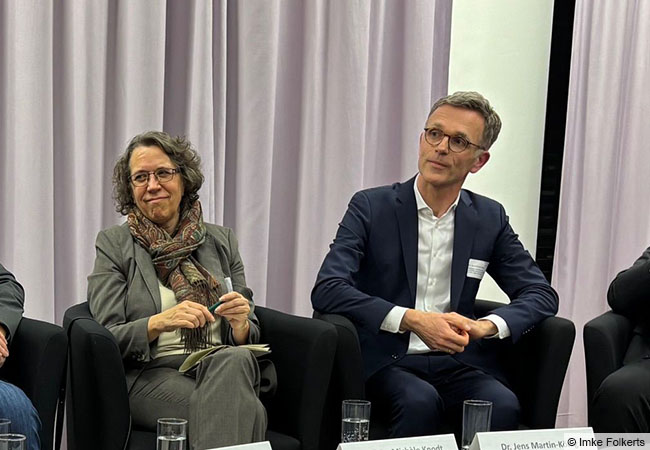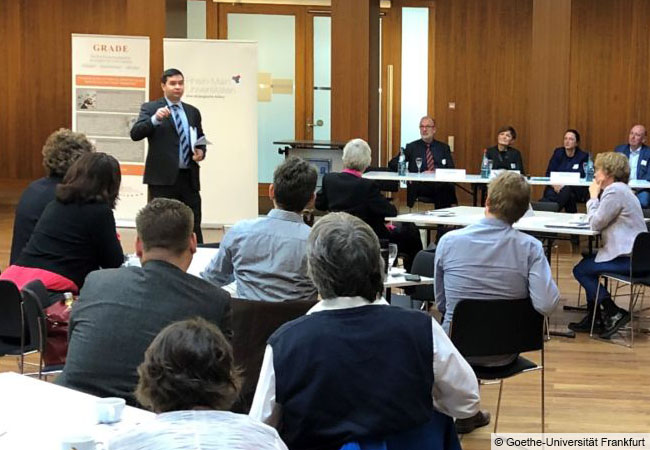 Boris Rhein, Hessen’s Minister for Science and the Arts, announced on the 16th of December that historian Professor Dr. Sybille Steinbacher had been called to the first chair for Holocaust Studies in Germany. In their decision to appoint her, senate and president’s office of Goethe University Frankfurt followed the recommendation of a committee of international experts. The creation of a chair for research into the history and impact of the Holocaust was anchored in a financial agreement signed with Goethe University Frankfurt and the Fritz Bauer Institute back in July 2015, after which the formal procedure for filling the new position was launched. The Foundation Board of the Fritz Bauer Institute has confirmed its approval of Steinbacher’s appointment. The Federal State of Hessen is co-funding the professorship with an additional € 150,000 per year.
Boris Rhein, Hessen’s Minister for Science and the Arts, announced on the 16th of December that historian Professor Dr. Sybille Steinbacher had been called to the first chair for Holocaust Studies in Germany. In their decision to appoint her, senate and president’s office of Goethe University Frankfurt followed the recommendation of a committee of international experts. The creation of a chair for research into the history and impact of the Holocaust was anchored in a financial agreement signed with Goethe University Frankfurt and the Fritz Bauer Institute back in July 2015, after which the formal procedure for filling the new position was launched. The Foundation Board of the Fritz Bauer Institute has confirmed its approval of Steinbacher’s appointment. The Federal State of Hessen is co-funding the professorship with an additional € 150,000 per year.
Boris Rhein, Minister for Science: “We are very happy that this important professorship can now be filled by a particularly renowned expert. This is a milestone on the route to a better understanding of Nazi crimes and the history of their impact up to the present day. This joint appointment by Goethe University Frankfurt and the Fritz Bauer Institute will also further enhance the integration of university and institute-based research.”
The historian, who currently still heads the Institute of Contemporary History at the University of Vienna, will take up her post on the 1st of May 2017. Steinbacher is a proven expert in the field of Holocaust Studies and has conducted extensive research on the subject. The professorship, which will be based at the Faculty of Philosophy and History of Goethe University Frankfurt, is shared with the Fritz Bauer Institute and sponsored by the Federal State of Hessen.
Professor Birgitta Wolff, President of the University: “Goethe University Frankfurt is particularly committed, not least due to its own chequered history, to the intellectual reappraisal of the Holocaust. Sybille Steinbacher will dedicate herself to this subject with our full support and fit in well as a colleague too.”
The new chair will also be in charge of the Fritz Bauer Institute, which the federal state government will continue to sponsor to the tune of about € 375,000 in 2017. That means a total sum of well over € 500,000 from federal state funds for the professorship and the institute in future.
“Linking the new professorship with the directorship of the Fritz Bauer Institute is a unique opportunity which we are using to advance the scientific reappraisal of the Holocaust to the greatest degree possible. The Fritz Bauer Institute is a centre of research and education of highest international acclaim and its importance radiates beyond the borders of Hessen too. Above all the confrontation with the ethical and moral structures with which the Holocaust is justified even up to the present day makes the research work so valuable and unique”, explained Boris Rhein, Minister for Science.
Jutta Ebeling, Chairwoman of the Foundation Board of the Fritz Bauer Institute: “With Sybille Steinbacher, the University and the Institute have appointed an internationally acknowledged scholar who combines the scientific investigation of Nazi crimes with tremendous sensitivity towards the subject’s significance in present times. We look forward to welcoming Sybille Steinbacher to Frankfurt am Main in the near future.”
Sybille Steinbacher already handled the subject of mass extermination in Nazi Germany in her Masters thesis at LMU Munich, which was also published in book form: “Dachau: The Town and the Concentration Camp in the Third Reich”. She then expanded her new approach in her doctoral dissertation, which she wrote at Ruhr-Universität Bochum and was entitled “‘Model Town’ Auschwitz. Germanisation Policy and Murder of Jews in East Upper Silesia”. This later formed the basis for an internationally much acclaimed standard reference work on the subject, which was translated into numerous languages. A second field in which Steinbacher is working is the social history of the early Federal Republic. Her monograph “How sex came to Germany. The struggle for morality and decency in the early Federal Republic” was based on her professorial thesis submitted at Friedrich Schiller University Jena in 2010.
Sybille Steinbacher has spent much of her career abroad: She was a scholar at the German Historical Institute Warsaw and Harvard University as well as a fellow at the United States Holocaust Memorial Museum. She was already visiting professor at Goethe University Frankfurt for the history and impact of the Holocaust in 2010 in conjunction with the Fritz Bauer Institute. Sybille Steinbacher has been professor of Contemporary History/Comparative Dictatorship, Violence and Genocide Studies at the University of Vienna since 2010 and Corresponding Member of the Austrian Academy of Sciences since 2014.
Source: Press Release 21/12/16







